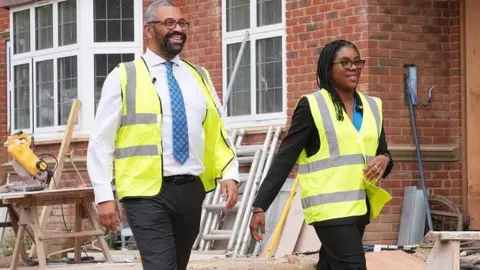In recent political discourse, the issue surrounding the housing of asylum seekers has stirred significant tension within the UK government. Newly appointed shadow housing secretary, Sir James Cleverly, has criticized Prime Minister Sir Keir Starmer’s administration for exacerbating public frustration regarding this matter. In an interview on BBC Radio 4’s Today programme, Cleverly articulated his belief that the Prime Minister has “amplified” concerns by suggesting that there is ample accommodation available for the increasing number of homeless individuals and asylum seekers. This claim seems to contradict the realities faced by many in need of housing, further fueling dissatisfaction among the populace.
Cleverly’s comments reflect a growing discontent with the government’s approach to addressing the housing crisis, which has been ongoing and widely recognized as a serious issue. The Conservative MP highlighted that disconnects like the one presented by the Prime Minister lead to widespread frustration, especially as more young people struggle to enter the housing market. The opposition, led by Labour, has pointed to the results of past Conservative decisions, including the repeal of mandatory housing targets, as contributing factors to the current housing crisis.
Further underscoring the Labour Party’s response, a spokesperson emphasized that while Labour is proactively collaborating with local regions to mitigate the entrenched housing crisis, the Conservatives have made no moves to rectify their previous missteps. “The Conservatives haven’t changed, and they haven’t once apologized for the mess they left behind,” the spokesperson claimed. This narrative illustrates a clear divide in policy approach between the two leading political parties.
Cleverly, in his inaugural task following his new appointment, visited a housing project in Hillingdon, north London, accompanied by Conservative leader Kemi Badenoch, who appointed him in a recent reshuffle of her leadership team. Having previously served as foreign secretary and home secretary, Cleverly’s transition back to a prominent front bench role marks a significant return for him after being sidelined in the Tory leadership contest last year.
As Cleverly settles into his role, he takes on responsibilities that intersect with those of Labour’s Angela Rayner, particularly concerning housing, communities, and local government. However, it is important to note that Cleverly does not serve in a deputy prime minister capacity, which could limit his influence on broader policy matters.
Upon discussing the government’s housing strategies, Cleverly asserted that the current administration made lofty promises about housebuilding but failed to deliver, thus culminating in rising dissatisfaction, particularly from younger generations eager to own homes. He acknowledged the Prime Minister’s previous remarks during a liaison committee meeting, in which Boris Johnson claimed sufficient housing existed for asylum seekers—a statement directly contested by Labour MPs who pointed out the rising costs associated with temporary accommodation due to asylum needs.
Cleverly’s commentary also alluded to a broader political strategy to confront what he perceives as misleading rhetoric from the government. He argued that such declarations of surplus housing presence only serve to deepen public frustration against a backdrop of actual shortages visible in many towns and cities across the UK.
The dialogue surrounding asylum housing is further complicated by issues around the European Convention on Human Rights (ECHR). Following Badenoch’s initiation of a review examining the UK’s stance on ECHR membership, Cleverly expressed a reluctance to immediately endorse or reject the proposition. He acknowledged that while the ECHR’s departure may not directly resolve the housing crisis, he would abide by party policy should changes arise from the review.
Through this complex interplay of accusations and policy assertions, it emerges that housing for asylum seekers is not merely a logistical concern but a critical political battlefield for both the Conservatives and Labour. The responses from various policymakers reveal a landscape where electoral strategies, public sentiment, and humanitarian responsibilities collide, suggesting that effective resolutions will require addressing deep-rooted systemic issues.











